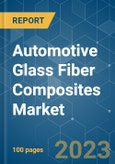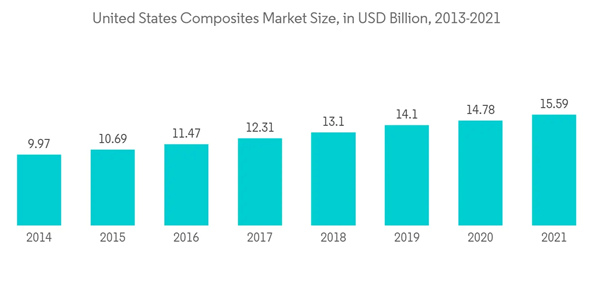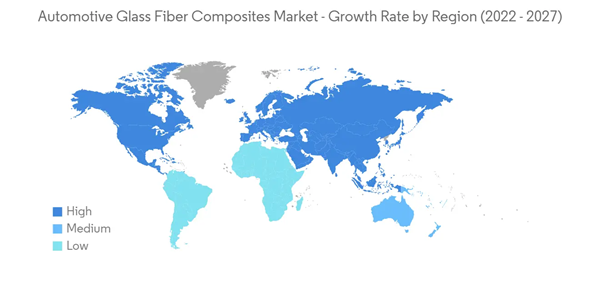Key Highlights
- The COVID-19 pandemic has severely impacted the automotive industry across the world. The disruptions in supply chain activities, the interruption in large-scale manufacturing, restrictions on travel, and the declining sales of vehicles during 2020, are responsible for the declining growth of the market. However, the surge in the manufacturing volume of passenger cars and hybrid electric vehicles was observed globally after the pandemic due to the easing of restrictions in the country. The market will cope with all the losses during the period and grow at a certain pace.
- Over the long term, the major growth drivers associated with this market are the rise in automotive production and the increasing demand for durable and lightweight materials because of stringent government regulations to reduce greenhouse gas emissions.
- The future of the global automotive glass fiber composites market looks bright, with opportunities in different automobile applications, such as interiors, exteriors, structural assembly, power-train and engine components, electrical and electronics, and others. The market for glass fiber composites in automobile structures is expected to be the fastest-growing segment due to the wide variety of applications.
- Strategic alliances between car manufacturers, glass fiber, and resin suppliers are the trends that directly impact the dynamics of the automotive composites industry. Within the intermediates type, short fiber thermoplastic (SFT), long fiber thermoplastic (LFT), and continuous fiber thermoplastic (CFT) are the major ones that are used in automotive applications. SFT is expected to be the largest market by value, mainly driven by power-train and engine components applications, which feature small complex-shaped components.
Automotive Glass Fiber Composites Market Trends
Increasing Adoption of Glass Fiber Composites in Automobiles
- Although automobiles have been around for over a century, their materials have mostly remained the same. Only in the past few decades that advanced materials, ranging from magnesium alloys to glass fibre composites, made their way into new-generation cars.
- The lightweight, cost, sustainability, and crashworthiness of vehicles can all be significantly improved by using novel composite variants. Composite materials reduce the weight of a vehicle component, resulting in improved fuel economy and lower emissions. Due to their superior mechanical properties, composite materials outperform conventional ones in terms of safety, comfort, and vehicle performance.
- Advanced materials, such as glass fibre composites, are essential for boosting the fuel economy of modern cars and maintaining performance and safety. Since it takes lesser energy to accelerate a lighter object than a heavier one, lightweight materials offer great potential for increasing vehicle efficiency. A 10% reduction in the vehicle's weight can transpire to a 6-8% increase in fuel economy.
- Glass fiber composites have become popular in the past few years. One of the reasons for fiberglass composite's relative success is that it has several advantages when compared to steel. It is corrosion-resistant, has significant chemical resistance, and is lightweight (three times less dense than steel). Fiberglass composite is mainly used in bumpers, hoods, and casings.
- Another area where this material is used is V-belts and timing belts, where glass strings are impregnated with rubber acting as reinforcement. Abrasion resistance is one other advantage of the fiberglass composite, which is why it is used for producing clutches and brake pads. Clutch disks are reinforced with woven fiberglass composites to maintain their integrity.
Europe Anticipated to be the Largest and Fastest Growing Market
- Europe is touted to be the fastest growing market due to the presence of many car manufacturers, such as BMW, Volkswagen, Groupe PSA, etc., who are adopting glass fiber composites in their cars.
- For instance, Government regulations, such as the greenhouse gas emission target in European countries, are also paving the way for OEMs to incorporate lightweight materials to decrease the overall vehicle weight.
- Germany is one of the leading automobile-manufacturing countries globally. The country has recovered to a reasonable extent from the economic recession that affected the economic condition of the country adversely. Germany is home to leading global automobile manufacturers, like Volkswagen AG, Daimler AG, BMW, Ford GmbH, and Opel. More than 5.1 million automobiles are manufactured annually in Germany. With an increase in the production of passenger vehicles and SUVs, the demand for fiberglass in the reinforcements of automotive components is expected to increase significantly during the forecast period.
Automotive Glass Fiber Composites Market Competitor Analysis
The automotive glass fiber composites market is mildly consolidated. Some major glass fiber composites market companies include Solvay Group, 3B (Braj Binani Group), Owens Corning, Veplas Group, and SAERTEX GmbH & Co.KG. Major players' product innovations aid the market. For instance,In June 2022, Teijin Limited (Teijin) announced that glass fiber sheet molding compound (GF-SMC) produced by Teijin Automotive Technologies (TAT), a Teijin subsidiary in the United States, has been chosen for the pickup box of the 2022 Toyota Tundra Pickup truck for the North American market. TAT's plant in Seguin, Texas, manufactures the pickup boxes. The GF-SMC is a molding material composed of a sheet of glass fiber impregnated with a thermosetting resin. TAT's proprietary composite formulation and molding technologies are used to press-mold the Tundra pickup box in one piece.
Additional benefits of purchasing the report:
- The market estimate (ME) sheet in Excel format
- 3 months of analyst support
This product will be delivered within 2 business days.
Table of Contents
Companies Mentioned (Partial List)
A selection of companies mentioned in this report includes, but is not limited to:
- Solvay Group
- 3B (Braj Binani Group)
- Owens Corning
- Jiangsu Changhai Composite Materials
- Veplas Group
- SAERTEX GmbH & Co.KG
- ASAHI FIBER GLASS Co., Ltd.
- Nippon Sheet Glass Company, Limited










